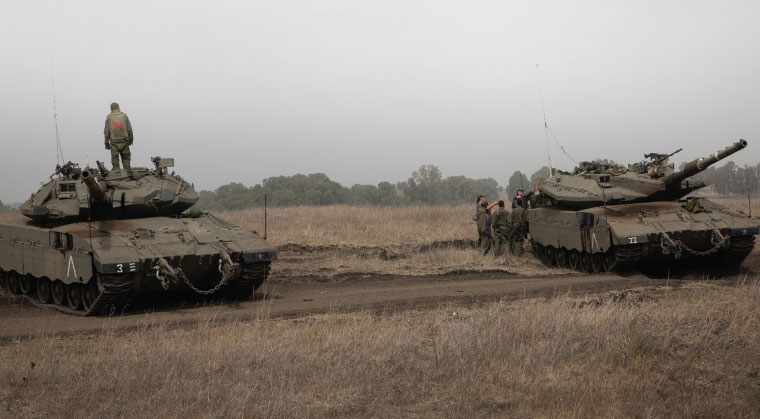Where War Games Are Played

IDF armor chief Ohad Najamahits back at land forces critics

"W
elcome to Pum Alon,” says Colonel Ohad Najama, using a nickname for the Israeli army’s officer training school outside Tel Aviv, where he is a senior office. “Truth is, you’re a rare sight around here.”
A rare sight?
“We don’t see many chareidim around here,” he explains. “I’m waiting for the day when the Golani Brigade will have a chareidi commander. It hasn’t happened yet.”
Colonel Ohad Najama is a tall man with a commanding presence and a firm handshake. We meet in his officer’s quarters, which are simple and spartan. Over his 20-year career in the IDF, Col. Najama has held a number of important positions, arguably the most important of which was his command of the 401st “Iron Tracks” Armored Brigade. He also previously served as battalion commander in the 401st and led his troops into battle during operation Cast Lead in 2008–2009. In October, he will assume command over the entire IDF tank corps.
Pum Alon is where the future commanders of the IDF are trained. In addition to teaching officers battle tactics, the school also teaches the officers how to command troops in the field and in the barracks.
My interview with Colonel Najama takes place as the Israeli army carries out a major military exercise in the north, including jets and naval forces, simulating a future battle with Hezbollah.
At the same time, the role of land forces in any future conflict is in doubt. Some have suggested, for instance, that the next war with Lebanon (and perhaps Iran) will be fought more in the cyber realm than in the physical one. Reports indicate that the United States recently attacked Iran’s military electronic infrastructure after that country shot down an American drone. During limited fighting in May, Israel attacked a building in Gaza housing Hamas’s cyberwarfare unit in what may be the first example of a military strike on cyberwarfare operators. In this environment, I ask Colonel Najama, what role will ground forces play?
“From a historical perspective, no war has ever been decided by air forces alone,” Najama replies. “NATO’s 1999 war in Kosovo was decided largely by air strikes, but even then there were guerilla forces fighting on the ground in Kosovo. Our experience proves that air strikes cannot win a major war and that Israel cannot rely solely on air forces for its defense.”
As a commander of the 401st Brigade, Najama says, he can state with confidence that there’s no corner of the Middle East his tanks can’t reach. “As soon as the political echelon gives the command — we will be there. We train for that nonstop.”
If that’s true, I wonder aloud, why hasn’t Gaza been conquered? If the capability exists, why not use it?
“In Gaza, we have had brief rounds of skirmishing, not a serious battle,” says Najama, referring to previous Gaza wars. “The fire power the IDF has employed in Gaza until now is a thousandth of what it has the power to unleash. I’ll repeat what I said earlier — if no land forces are deployed, there is no war. There are other names for that — a round of fighting, even a military operation — but not war.”
And what kind of firepower are we talking about, I ask.
“I’m not allowed to talk about it, but the Mark IV Merkava tank is one of the most efficient, precise, and lethal weapons in modern warfare,” he explains. “There is nothing else like it. The ‘Windbreaker’ system defends the tank against anti-tank weaponry and it has complex sensory capabilities.”
Hezbollah has significantly increased its fighting abilities since Israel last went to war with the terror group, I note. But Najama dismisses the idea that Hezbollah is interested in a real war with Israel. Unless, however, escalating tensions between the United States and Iran pull in Tehran’s terror proxy. There is an assumption in the Israeli security establishment that Iran is prepared to initiate strikes on Israel from either Syria or Lebanon if such a conflict escalates, though the chances of that happening are not high.
“The whole situation could spiral out of control because Iran could force [Hezbollah] to act or because of Iranian attacks on the northern border,” he says. “In the various exercises the IDF is carrying out you can see total cooperation between the different arms, because in the next war we all have to work together with enthusiasm to secure a victory for Israel.”
Shift the Board
Speaking of those American-Iranian tensions, security establishment sources in Israel were of a mixed mind over President Trump’s recent decision to refrain from striking Iranian forces after that country downed an American drone last week.
While there were those who praised Trump’s decision, others argued that he was playing right into the mullahs’ hands. Most agreed that Trump had shifted the playing board to the Iranians. It is now up to Tehran to decide whether to escalate the conflict. What’s more, one security figure told Mishpacha, Trump has now earned a certain moral authority to carry out a much tougher retaliation in the future. He has also proven himself as a measured leader, something that will serve him well at the G20 summit later this week, the source said.
(Originally featured in Mishpacha, Issue 766)
Oops! We could not locate your form.













